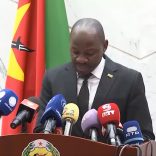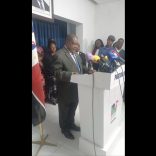Mozambique: Defence forces are containing extremists in Cabo Delgado - government | Watch
District Elections: Opposition hits out at Commission’s “umbilical links” with Frelimo

File photo: CIP
The Mozambican opposition yesterday accused members of the Commission created to assess the viability of the 2024 district elections of having “umbilical links” with Frelimo, adding that the study produced by this entity aims to legitimise the postponement of the vote.
“The personalities on this Commission all have umbilical links with Frelimo. Mr Aguiar Mazula, who was the head of that Commission, is a senior member of Frelimo and was once Minister of State Administration and Defence. Joaquim Veríssimo was Minister of Justice and is also a member of Frelimo,” José Manteigas, spokesman for the Mozambican National Resistance (Renamo), the main opposition party, told Lusa.
At issue are the findings of the Commission for Reflection on the Feasibility of Holding District Elections (CRED), made up of “personalities of recognised merit”, which concluded that conditions for the holding of the ballot, which was scheduled for 2024, do not exist.
For the Renamo spokesperson, in addition to being made up of people with links to the ruling party, the Commission was only intended to “legitimise” the postponement of the ballot, a position that Frelimo has publicly assumed.
“There is no room for reflection on the Constitution. Furthermore, this Commission only brought conclusions which are, in fact, an echo chamber of what the President of the Republic wanted. A decision had already been taken,” Manteigas stressed, adding that the opposition will “use all possible means to stop the postponement of the elections”.
The Democratic Movement of Mozambique (MDM) also considers that the commission presented a result that Frelimo expected, warning that the commission is legitimising an amendment that violates the Constitution.
“This Commission was created to subvert the popular will and a Constitutional command,” MDM spokesman Ismael Nhacucue asserted, adding that it was an exercise to “deceive the people”.
“We, as MDM, will resort to all means at our disposal to avoid the postponement of this vote,” Nhacucue declared, echoing that the Commission was composed of people linked to the party in power.
Lusa tried, without success, to obtain a comment from the Commission.
The Commission study delivered to the Government on Friday considers that there are no conditions for scrutiny, suggesting a punctual revision of the Constitution to accommodate the postponement of the first district elections.
The document also warns that there are risks of non-compliance between the legal package of decentralisation and the fundamental law of the country, as is currently the case, in which the provincial representation bodies enjoy attributions that go beyond their limits.
The Commission indicates that the experience in the provinces has been marked by duplication and overlapping of competences and structures, lack of clarity and criteria for sharing material and human resources and lack of harmonisation of laws.
The study points to a risk of duplication of structures and competences at the district level, which would necessarily lead to a significant increase in the financial effort needed to support the new bodies.
The introduction of district elections from 2024 onwards for the administrators of the 154 districts, currently appointed by the central government, is part of the Peace and National Reconciliation Agreement signed in August 2019 between the Frelimo Government and the Mozambican National Resistance (Renamo), which maintains an ‘armed wing’ in the process of disarmament, demobilisation and reintegration (DDR).












Leave a Reply
Be the First to Comment!
You must be logged in to post a comment.
You must be logged in to post a comment.